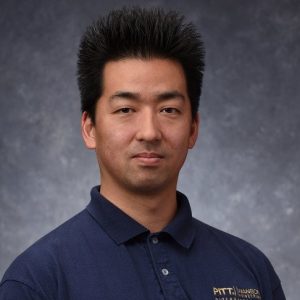 By Cristina D’Imperio
By Cristina D’Imperio
The B.I.O.N.I.C. Lab, headed by Takashi Daniel Kozai, PhD, McGowan affiliated faculty and Assistant Professor in the Department of Bioengineering at the University of Pittsburgh, studies non-neuronal braincells.
While there are approximately 100 billion neurons in the brain, there are 10 times more non-neuronal cells, or glial cells, of which there are three major types: astrocytes, oligodendrocytes, and microglia. Understanding the role non-neuron cells play in regulating neural activity could, in turn, help clinicians better treat and address brain injury and neurodegenerative diseases like multiple sclerosis (MS) and amyotrophic lateral sclerosis (ALS).
Dr. Kozai’s latest research involves in vivo imaging technology that assesses how brain implants and oligodendrocytes interact. He is the principal investigator of a study titled “Mechanisms of Oligodendrocyte Activity on Chronic Brain Implants and Recording Performance,” which has received additional funding from the National Institute of Neurological Disorders and Stroke (NINDS).
Dr. Kozai and his team of researchers will combine multiphoton imaging technology and neural engineering technology to better examine how oligodendrocytes impact neural health following brain injury and neurodegenerative disease in real time.
According to the project abstract, their work has the potential “to output basic and clinical science level knowledge relevant to neural engineering, ischemia, stroke, intracortical hemorrhage, aneurysm, traumatic brain injury, MS, ALS, and closed-loop neurostimulation.”
Find the full abstract of the project here.
Visit B.I.O.N.I.C Lab here.
